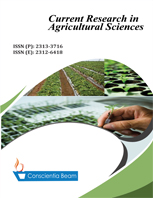Water extracts of pomegranate peel and hojicha tea leaf inhibit the growth of methicillin-resistant staphylococcus aureus
DOI:
https://doi.org/10.18488/cras.v11i1.3632Abstract
Methicillin-resistant Staphylococcus aureus (MRSA) strains capable of causing infections and food poisoning have emerged worldwide in response to the use of various antimicrobial agents. To date, several drugs have been used to combat these bacteria. We focused herein on functional foods (particularly food waste products), which are safer and exhibit fewer side effects than drugs. The objective of present study is to elucidate the growth inhibitory effects of several food waste products on Staphylococcus aureus using three different Staphylococcus aureus strains, JCM2413 as the standard strain, and MW2 and N315 as MRSA strains. One percent water extracts of ten food waste products (grapefruit peel, pineapple leaf, dragon fruit peel, persimmon peel, turnip leaf, pomegranate peel, apple peel, potato peel, hojicha tea leaf, and banana peel) were added to the medium, and colonies were counted after a 24-hour incubation. Significant decreases were observed in MW2 and N315 colonies with pomegranate peel and hojicha tea leaf extracts. By contrast, no significant difference was observed in JCM2413 in any of the extracts. We demonstrated that water extracts of pomegranate peel and hojicha tea leaves possess bacteriostatic activity specific to MRSA. Our findings help to improve food safety with reducing food loss. However, further studies are needed to elucidate the detailed mechanism of the effects of pomegranate peel and hojicha tea on MRSA.

